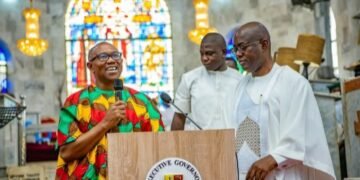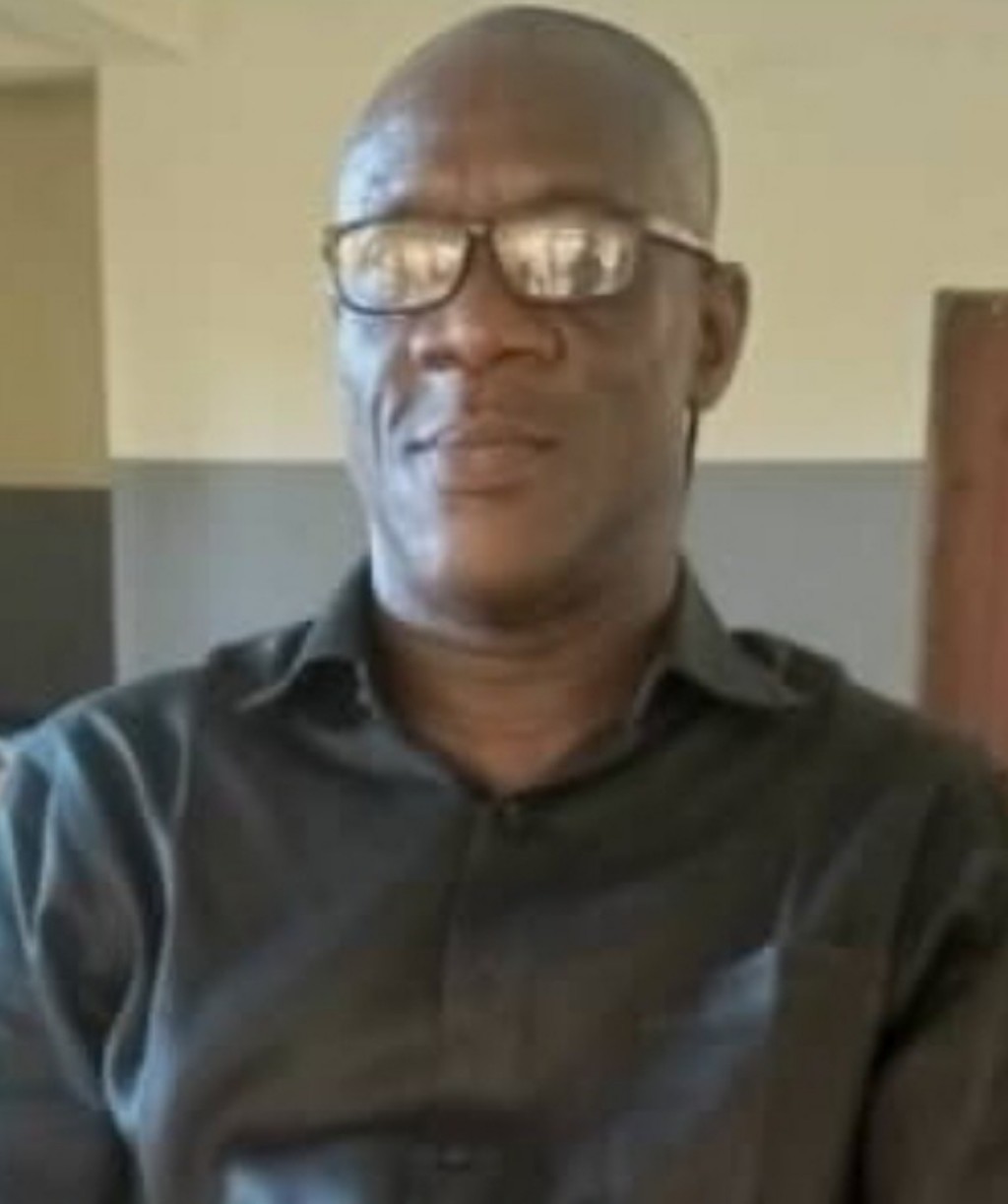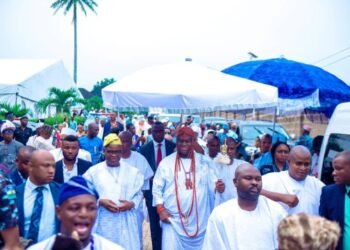“When you have an “absolute CJN”, as we do, presiding over a Supreme Court that has the final say in all legal jurisprudence, we can only seek solace in the bosom of the Creator, who is the Ultimate Judge. Consummatum est – it is finished!”
I would call on Títírí lorí ogbo (the aged one). I would summon Bììrìpé lomi okòó dà (the water that drifts the canoe are both ways). I would ask Dídà lomi okòó dà, omi ókò kii yi (the water that drifts the canoe simply waves, it doesn’t overturn) to come in haste. I would remember the day the trio sat on the divination mat for Oodua, whose praise name is Atèwònrò, when his enemies told him that he would never ascend the throne of his forebears. When they all arrive, I would pay homage to the ones who assured Oodua that whether he offered the prescribed sacrifices or not, he would ascend the throne of those before him.
And to my opponents, the very ones who travelled as far as the United States of America (USA), and fought me up to the Supreme Court, I will let them know, the same way Oodua told his opponents that: Sábèé lóró (the people of Sábèé have full arsenal); Tògún lófà (the people of Tògún have arrows). I will warn them that: tí wón bá tún sígun Ìlúbìrin kì wón má ba won lo món (When next they wage war against Ìlúbìrin – the town of women – they should not participate again).
It was a battle badly fought. It was a victory won with blood and sweat. The scars will remain indelible. Generations yet unborn will tell the story. The international community will marvel at our ingenuity. The merits and demerits of the Supreme Court decisions will be topics for future symposia.
As individuals, we will have lessons to learn and unlearn. While the bottom line is that a winner has finally emerged and all disputes are settled, the echoes of how we arrived at this stage of our nationhood will keep ringing in our brains.
Someone asked me what my take-home from the Supreme Court judgment was. I answered by saying that every parent or guardian now has the onerous responsibility of impressing on their children and wards alike that crime does not pay, irrespective of the opinion of the highest court of the land.
The Supreme Court is the final authority in all legal matters in Nigeria. Its finality, however, does not mean that its decisions on all matters are without human errors. But the court is covered by the very provisions of the constitution which makes it final. Besides, the legendary Justice of the Supreme Court, the late Hon. Justice Chukwudifu Akunne Oputa, recognised this fact when he submitted thus: “We are not final because we are infallible; rather we are infallible because we are final.”
One of the cases similar to the Atiku versus Tinubu matter in Nigeria’s legal jurisprudence is that of the 1979 Awolowo versus Shagari matter, where the Supreme Court then, under the leadership of the late Justice Fatayi-Williams, ruled on the contentious issue of what constituted two-thirds of the then 19 states of the Federation. After the legal fireworks, their Lordships ruled in favour of Shagari and added a caveat: the case must never be cited in future legal matters.
Till date, not a few Nigerians believe that the Supreme Court then erred by the calculation that 12 states, and not 13, would make two thirds of a 19-state structure. In his piece titled: “Awolowo vs Shagari- A Case of Compromise Between Law and Political Expediency”, M. Olu Adediran, says: “… It was a case in which all Nigerians and in fact the whole world was highly interested. The case further showed the sign of the attitude or toga the Supreme Court would wish to put on concerning constitutional issues likely to arise in the Second Republic.”
That was some 44 years ago. The question we may wish to ask ourselves today as a people is: What has changed?
The lesson in the final warning of the apex court that its decision on the matter should never be used as future references, to a lay man like me, is that the Supreme Court then knew that it suffered human error in arriving at that decision, especially on the issue of two-third of 19. The court, in its supreme decision, threw overboard the expert calculation and opinion by the late Professor of Engineering and Applied Mathematics, Ayodele Awojobi, who submitted that no one could determine a two-thirds majority in Kano without the use of a computer.
Interestingly, just like in the present case, the apex court then also held that there was non-compliance with the provisions of Section 34A(1)(c)(ii) of the Decree 1977, which spelt out the modus operandi for the election that for a candidate to be declared winner of an election, he has to have a majority of the votes cast and not less than one-fourth or one-quarter of the votes in two-third of the states in the Federation. In the alternative, the court ruled that by the provision of Section III subsection 1, which provides that non-compliance with part II will not affect the result of the election, it dismissed the case and Shagari was sworn in as the president.
Justice Kayode Eso, however, gave a dissenting judgement, which suffered what all minority opinions suffer in the hands of the majority. The rest is now history. But history will always repeat itself, when the lessons therein are not learnt by all the parties concerned.
Truth be told, there can never be a completely perfect judgment, especially in a clime like Nigeria, where the judiciary is precariously tied to the apron string of the executive. Our judiciary will only be free, fair, and just when it truly gains independence, and is no longer treated as an appendage of the executive arm. No matter how independent-minded our judges and justices pretend to be, if their appointments, or the ratification of their appointments, is determined by the head of the executive, the judiciary will continue to suffer mistrust from the public.
While no one expects perfect judgment from the scenario we have here in Nigeria, our judicial officers must have at the back of their minds that they owe the people the duty to build confidence in the system. One of the lessons of the Supreme Court judgment in the Tinubu vs others is the fact that our judiciary is not snail-speeded as they have made it to be. What the seven wise men did on Thursday last week is novel in the annals of Nigeria’s judiciary. Nobody has ever given it a chance that a matter could come before our courts on a Monday and, by Thursday, it has been dispensed with!
When the news broke that the Supreme Court would be delivering the judgment on Thursday after listening to all parties on Monday, many Nigerians did not believe it. But it happened. It did not just happen, all the seven Justices were unanimous in their decision that, irrespective of the flaws in the elections, the result cannot be invalidated.
Where did that speed come from? Why has it been impossible for the same court to apply the same speed to all other matters that have been before it over the years?
One man answered these questions. He is one man who should know, and actually knew what the problems are with our apex court. His name is Musa Dattijo Muhammad, Justice, Supreme Court (JSC). He is now retired. Until Friday, October 27, 2023, when he took his final bow as a JSC, Justice Dattijo was the second -in-command to the Chief Justice of Nigeria, Justice Olukayode Ariwoola.
As is customary, a valedictory session was organised for the retiring JSC, who was in service for 47 years, and had attained the age of 70. Against “his will”, Dattijo spoke at the event and what he said speaks to the reasons why cases gather dust on the shelves of our Supreme Court, and possibly the courts below it.
According to the foremost jurist, the biggest problem of the Supreme Court today has to do with the composition of the court. Hear him: “The conversation about the diminishing number of Justices at the Supreme Court has become a refrain. As I bow out today, the number is further reduced to 10 against the constitutional requirement of 21 Justices. That this avoidable depletion has affected and will further affect the court and litigants is stating the obvious.”
Justice Dattijo did not stop there. He spoke to the contentious issue of election petitions and the need to properly constitute the Supreme Court Panel that would hear the appeal emanating from the presidential election petition tribunal, and the governorship elections.
The retired jurist lamented thus: “We are in an election season where the Election Tribunals and appellate courts are inundated with all manner of petitions and appeals. The Supreme Court is the final court in the Presidential, Governorship and National Assembly election appeals. Yet, there are only 10 Justices left to determine these matters.
“Constitutionally, each of these appeals requires a panel of seven Justices to sit on them. When a panel of seven Justices is constituted to sit on a particular appeal, only three Justices are left out. Even when regular appeals are being heard in the Supreme Court, a panel of five Justices is required to sit.
“We must not forget that the Court, being the highest in the land, receives all manner of appeals from the court below… Again, beside election matters which are seasonal, the Supreme Court docket is overflowing with civil and criminal appeals, some of which took many years to arrive. Most of these are still pending. Several have not even been assigned hearing dates.”
He went to the crux of the matter by submitting that: “To ensure justice and transparency in presidential appeals from the lower court, all geo-political zones are required to participate in the hearing. It is therefore dangerous for democracy and equity for two entire regions to be left out in the decisions that will affect the generality of Nigerians. This is not what our laws envisaged.
“Although it can be posited that no one expected the sudden passing of Hon. Justice Nweze JSC, yet, it has been two years and seven months since the previous Justice from the South-East died and no appointment was made. Ditto for the replacement of Justice Eko JSC of North-Central.”
With his exit from the apex court, Justice Dattijo pointed out that “the North-Central zone that I represent ceases to have any representation until such a time new appointments are made. My lord Hon. Justice Ejembi Eko JSC who also represented the zone retired on the 23rd of May 2022. It has been a year and five months now. There has not been any replacement.
“With the passing of my lord, Hon. Justice Chima Centus Nweze, JSC on 29th July 2023, the South-East no longer has any presence at the Supreme Court. My lord, Hon. Justice Sylvester Nwali Ngwuta JSC died on 7th March 2021. There has not been any appointment in his stead for the South-East.”
The retiree stressed that there had been sufficient time for the management of the apex court to fill all the vacancies in the Supreme Court and ensure that all the zones are adequately represented as provided for, but it failed to do that. Yet the rule says all geo-political zones must be represented in the hearing of the presidential appeals.
The seven JSCs who sat on the panel that determined the Tinubu vs Atiku matter are Justice John Inyang Okoro (Akwa Ibom, South-South), Justice Uwani Musa Abba-Aji (Yobe State, North-East); Justice Mohammed Lawal Garba (Zamfara, North-West); Justice Ibrahim Saulawa (Katsina, North-West); Justice Adamu Jauro (Gombe, North-East); Justice Tijani Abubakar (Yobe State, North-East), and Justice Emmanuel Agim (Cross River, South-South).
The issue before us is the fact that, as Justice Dattijo openly pointed out, the Supreme Court “deliberately” refused to have a full complement of justices as provided in the statutes establishing it. Could the absence of three geo-political zones (North-Central, South-East and South-West), on the presidential appeal panel that heard the Tinubu vs Atiku matter be fatal to the decision of the Supreme Court in the matter? The answer is hanging in the air.
Why, for instance, was there no JSC from the South-West on the panel, when Justice Dattijo said that the zone has three serving Justices? Was it an error of omission, or a “deliberate” act? We may never know.
However, Justice Dattijo’s words, to wit: “…Appropriate steps could have been taken since to fill outstanding vacancies in the apex court. Why have these steps not been timeously taken? It is evident that the decision not to fill the vacancies in the court is deliberate”, will continue to assail our consciousness.
The retired JSC did not only point out the anomaly, but he also equally did justice to the imperial power wielded by the CJN, who is the alpha and omega as the “Chairman of the National Judicial Council (NJC) which oversees both the appointment and discipline of judges. He is equally Chair of the Federal Judicial Service Commission (FJSC), the National Judicial Institute (NJI), the Legal Practitioners’ Privileges Committee (LPPC), that appoints Senior Advocates of Nigeria.”
When you have an “absolute CJN”, as we do, presiding over a Supreme Court that has the final say in all legal jurisprudence, we can only seek solace in the bosom of the Creator, who is the Ultimate Judge. Consummatum est – it is finished!
•Ayodele is an editorial staff of the Nigerian Tribune.





























